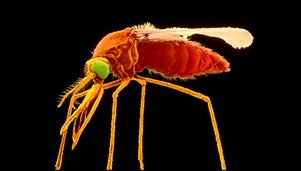Press release
24/07/2015
First malaria vaccine receives positive scientific opinion from EMA
Mosquirix to be used for vaccination of young children, together with established antimalarial interventions
The European Medicines Agency’s Committee for Medicinal Products for Human Use (CHMP) has adopted a positive scientific opinion for Mosquirix (Plasmodium falciparum and hepatitis B vaccine), for use outside the European Union (EU).
The malaria vaccine Mosquirix, also known as RTS,S/AS01, was submitted to EMA under a regulatory procedure (Article 58) that allows EMA to assess the quality, safety and efficacy of a medicine or vaccine and its benefit-risk balance, although it will not be marketed in the EU. This means that EMA can help facilitate access to new medicines for people living outside the EU.
Mosquirix is intended for use in areas where malaria is regularly found, for the active immunisation of children aged 6 weeks to 17 months against malaria caused by the Plasmodium falciparum parasite, and against hepatitis B. After decades of research into malaria vaccinations, Mosquirix is the first vaccine for the disease to be assessed by a regulatory agency.
The CHMP highlighted in its opinion that Mosquirix is for use in line with official recommendations that take into account the risk of Plasmodium falciparum malaria in different geographical areas and available malaria control interventions. These recommendations will be defined by the World Health Organization (WHO) and regulatory authorities in the non-EU countries where the vaccine would be used.
As in all Article 58 procedures, the CHMP worked closely with other experts, including from WHO and regulatory authorities from the relevant countries. In its assessment, the CHMP applied the same rigorous standards as for medicines to be marketed within the EU.
About Mosquirix
Mosquirix is intended to protect against malaria caused by Plasmodium falciparum. Because of the vaccine’s composition it also protects against hepatitis B (see note 3 below).
The main evidence derives from a large clinical trial conducted in seven African countries (Burkina Faso, Gabon, Ghana, Kenya, Malawi, Mozambique and Tanzania). Data from this trial showed that Mosquirix provides modest protection against Plasmodium falciparum malaria in children in the 12 months following vaccination. The vaccine was effective at preventing a first or only clinical malaria episode in 56% of children aged between 5-17 months and in 31% of children aged 6-12 weeks. The efficacy of the vaccine decreased after one year. The safety profile of the vaccine was considered acceptable.
Based on the results of the trial the CHMP concluded that despite its limited efficacy, the benefits of Mosquirix outweigh the risks in both age groups studied. The CHMP considered that the benefits of vaccination may be particularly important among children in high-transmission areas in which mortality is very high.
Because the studies showed that Mosquirix does not offer complete protection, and the protection it provides decreases in the longer term, it is important that established protective measures, for example insecticide-treated bed nets, continue to be used in addition to the vaccine.
The CHMP also agreed a follow-up programme with the company to ensure that the safety and effectiveness of Mosquirix is continuously monitored as described in the risk management plan.
About malaria
Malaria is a disease caused by parasites known as plasmodia, which are transmitted to people through the bites of infected mosquitoes. While five different types of plasmodia parasites cause malaria, Plasmodium falciparum is recognised as the most serious cause of malaria death and disease. If left untreated, malaria can quickly become life-threatening. According to WHO, in 2013 627,000 deaths from malaria were reported globally, of which 562,000 (~90%) occurred in the African region mostly among children under the age of 5 years (82%).
Key malaria control interventions include prompt and effective treatment with artemisinin-based combination therapies, use of insecticide-treated bed nets, and indoor residual spraying with insecticide to control the mosquitoes.
More about the procedure
The applicant received scientific advice from the CHMP in collaboration with WHO, pertaining to the quality and clinical aspects of the dossier.
The positive scientific opinion adopted by the CHMP at its July 2015 meeting is a pre-requisite for a WHO policy recommendation for the use of Mosquirix in vaccination programmes. National regulators in the countries where the vaccine will be used will take a decision on licensing the vaccine in their jurisdictions.
WHO will provide its recommendations on use of Mosquirix by November 2015. WHO’s policy recommendations take into account several additional factors not addressed by EMA. These include feasibility of implementation, affordability and cost-effectiveness, and the public health value of the vaccine in relation to other available malaria control measures and vaccines.
Notes
- The marketing authorisation applicant for Mosquirix is GlaxoSmithKline Biologicals S.A.
- Mosquirix is a recombinant vaccine that contains an adjuvant. It is composed of a Plasmodium falciparum circumsporozoite protein fused with hepatitis B surface antigen (rts), and combined with hepatitis B surface antigen(s) in the form of non-infectious virus-like particles (vlps) produced in yeast cells (Saccharomyces cerevisiae) by recombinant DNA technology. Therefore, the vaccination gives protection against hepatitis B. However, it should not be used to protect against hepatitis B in settings that do not require malaria prevention.
Source: EMA website


